Business in Saudi Arabia. Prince bin Talal
Saudi Arabian Economy, Logistics and Foreign Trade. Riyadh and Jeddah. Lubna Olayan
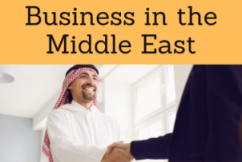
The Kingdom of Saudi Arabia.
- Saudi Arabia was the birthplace of the Prophet Muhammad
- Two holiest cities of Islam, Mecca and Madinah are in Saudi Arabia
- The Kingdom of Saudi Arabia is one of the economic, religious, political, and financial centers of MENA economies (Middle East and North Africa)
- Saudi Arabia is a major player on the regional political scene
- Saudi Arabia represents 25% of the Gross Arab National Product
- Introduction to the Kingdom of Saudi Arabia (Middle East)
- Saudi Arabian Economy
- International Trade of Saudi Arabia
- Transport and Logistics
- Doing Business in Riyadh and Jeddah
- The Holy City of Mecca
- Saudi Economic Cities:
- King Abdullah
- Jazan
- Prince Abdul Aziz
- Knowledge Economic City
- Saudi Industrial Cities:
- Jubail
- Yanbu
- Invest in Saudi Arabia
- Case Study:
- Saudi Aramco
- Dallah Albaraka
- Savola Group
- SABIC
- Arab Funds:
- Access to the Saudi market
- Business Plan for Saudi Arabia
Saudi Arabian Businesspeople.
- HRH Prince Alwaleed bin Talal
- Lubna Olayan
- Mohammed Al-Amoudi
- Sulaiman Al-Rajhi
- Mohamed Al Jaber
- Hayat Sindi
- Haifa Al-Mansour
International Trade and Business in Saudi Arabia:
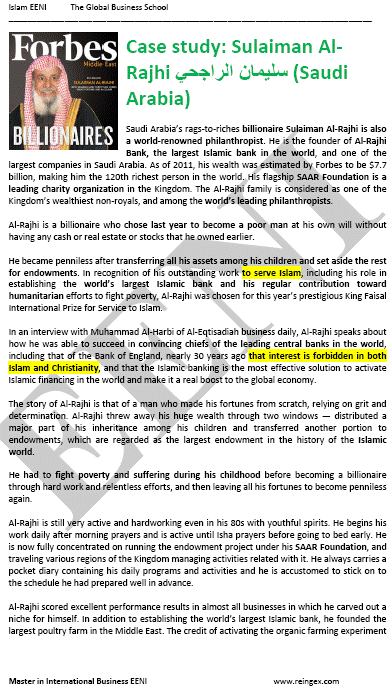

The educational aims of the Subject “Foreign Trade, Logistics and Business in the Kingdom of Saudi Arabia” are:
- To analyze the Saudi Arabian Economy, Logistics and Global Trade
- To conduct research on business opportunities in the Kingdom of Saudi Arabia
- To explore the Saudi Arabian trade relations with the student's country
- To learn about Saudi Arabian Trade Agreements
- To examine the profile of Saudi Arabian Businesspeople
- To develop a business plan for the Saudi Arabian Market
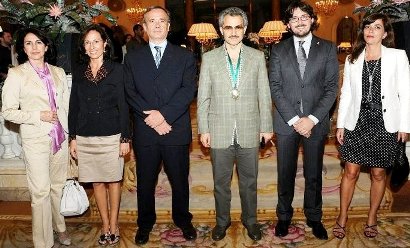
EENI delivers to HRH Prince Alwaleed bin Talal a Master Honoris Causa.

The Subject “Foreign Trade, Logistics and Business in Saudi Arabia” is included within the curriculum of the following academic programs at EENI Global Business School:
Masters: International Business, Foreign Trade.


 Masters adapted for Saudi Students.
Masters adapted for Saudi Students.
Languages:  or
or  Arabia Saudita
Arabia Saudita  Arabie Saoudite.
Arabie Saoudite.
- Subject Credits “Doing Business in Saudi Arabia”: 3

International Trade, Logistics and Business in Saudi Arabia.

Transport and Logistics in Saudi Arabia
- Access to the Eurasian Corridors:
- China-Pakistan Economic Corridor
- China-Central-West Asia Economic Corridor
- Kyrgyzstan-Iran Corridor
- Nearest African Ports

Saudi Arabian Preferential Access and Trade Agreements:

- World Trade Organization (WTO)
- Agreement on Trade in Services (GATS)
- Agreement on Sanitary Measures
- Agreement on Technical Barriers to Trade
- Agreement on Preshipment Inspection
- Agreement on Safeguards
- Trade Facilitation Agreement
- World Customs Organization (WCO)
- Kyoto Convention
- International Road Transport Union (IRU)
- TIR Convention
- Guidelines on Safe Load Securing for Road Transport
- International Maritime Organization (IMO)
- Convention for Safe Containers
- Istanbul Convention
- Customs Convention on Containers
- International Bureau of Containers and Intermodal Transport (BIC)

- Arab League
- Summit of South American-Arab Countries
- Asia-Middle East Dialogue
- Islamic Development Bank
- Economic Commission for Western Asia (ESCWA)
- Organization of Islamic Cooperation (OIC)
- Committee for Economic Cooperation
- Islamic Chamber of Commerce
- Islamic Centre for Development of Trade
- Economic Centre for Islamic Countries
- Afro-Arab Cooperation
- Arab Bank for Africa (BADEA)
- Arab Gulf Programme
- Arab Trade Financing Programme
- Arab Development Funds
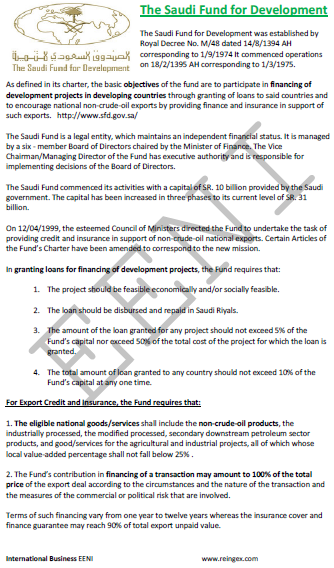

- Asia Cooperation Dialogue
- Colombo Plan
- United Nations
- World Bank
- World Trade Organization (WTO)
- African Development Bank
- International Monetary Fund
- Capital of Saudi Arabia: Riyadh
- Official language of Saudi Arabia: Arabic
- Type of Government: Absolute Monarchy
- Area of Saudi Arabia: 2,149,690 km²
- Population of Saudi Arabia: 30 million people
- The Saudi Arabian Currency: Saudi Riyal
- The headquarters of the Arab Gulf Programme for United Nations Development Organizations
- Abolition of Slavery in Saudi Arabia: 1962
- Borders of Saudi Arabia: Bahrain, Iraq, Jordan, Kuwait, Qatar, the Emirates and Yemen
- Maritime borders (Gulf of Aqaba): Israel and Egypt
Religion in Saudi Arabia:
- Sunni Islam is the main religion of the Kingdom of Saudi Arabia
- Major Fiqh (Islamic Jurisprudence) School is Hambali
- 20% of the population is Shiite
In Saudi Arabia, Islamic-based laws affect trade regulations, such as Restrictions on certain products (alcohol, for example), which limits exports of these goods and affects the prices of other exported products.
Saudi Arabia belongs to the Arab Economic Area.
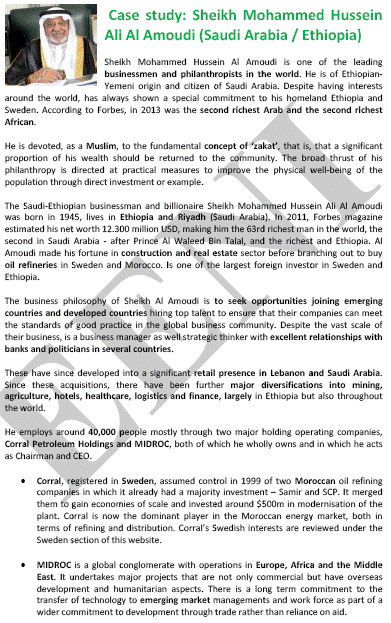

Saudi Arabian Economy.
- The Kingdom of Saudi Arabia is the largest economy in the Middle East and 24th largest exporter in the World
- The economy of the Kingdom of Saudi Arabia is based on the Oil sector
- Saudi Arabia has 25% of the proven petroleum reserve in the World
- The Saudi Arabian Petroleum Company (Saudi ARAMCO) is the largest petroleum producing company in the World
- In the last years, the Saudi Government has taken measures to diversify the economy, despite the global rise in energy prices, the non-petroleum sector has been a decisive sector in the economic growth of Saudi Arabia
- Saudi Arabia is the third economy in the World by Macroeconomics stability
- The Saudi Riyal is one of the most steady currencies in the World
- Saudi Arabia is the largest free economic market in the Middle East
- The Saudi market has a high purchasing power in the region
- The headquarters of OIC and the Islamic Development Bank are in Jeddah
- Public sector plays a major function in industrial activity
- Saudi Arabia has a robust GDP growth in the last years
Lubna Olayan:
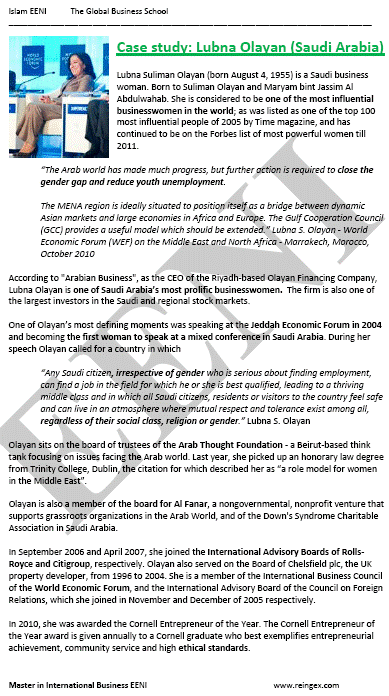
Sample: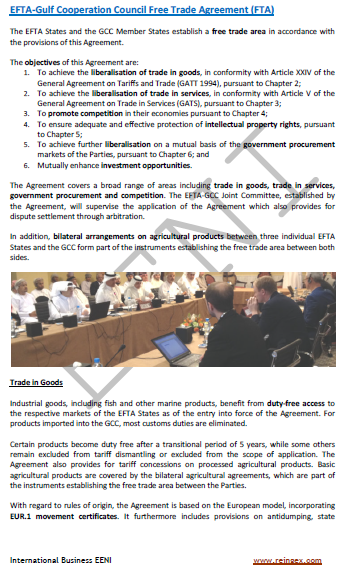
Sample: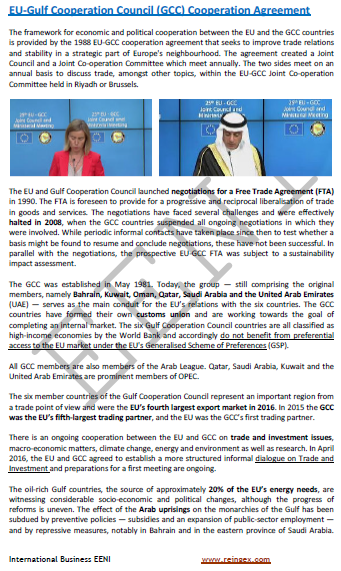
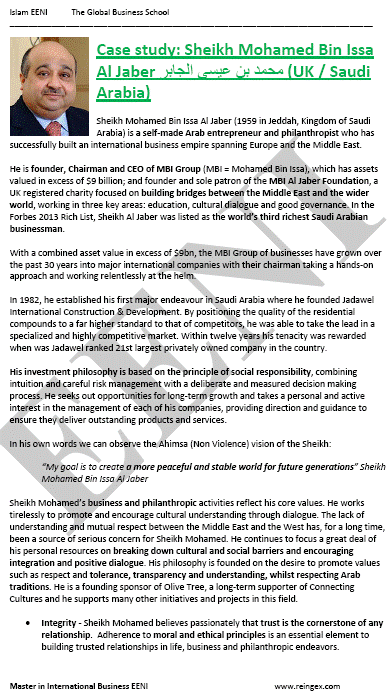
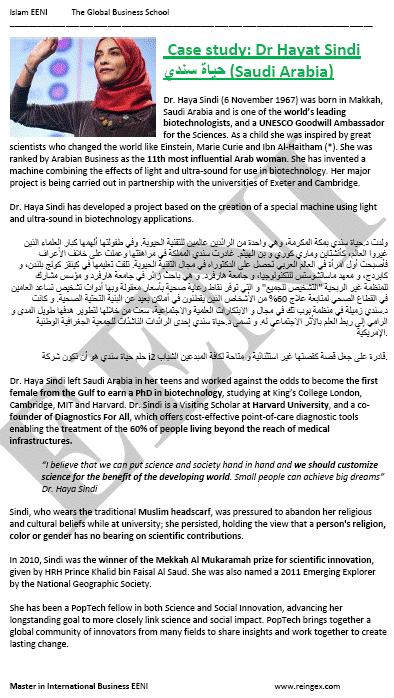
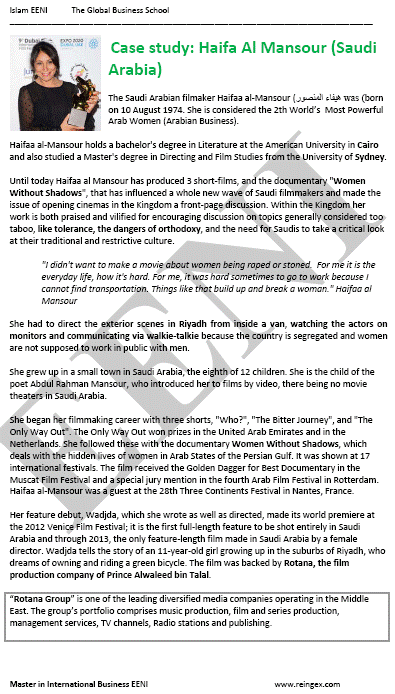
(c) EENI Global Business School (1995-2025)
Top of this page








 WhatsApp
WhatsApp